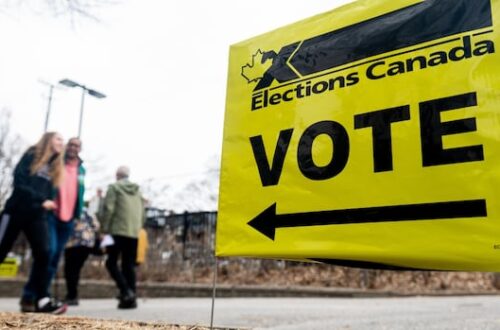The Canadian military has witnessed a resurgence in hateful conduct and racism reports over the last year following several years of decline, according to data obtained by CBC News.
The detailed information comes as the army deals with a fresh set of extremism and disreputable conduct allegations.
The sudden turnaround has piqued the curiosity of far-right extremism experts, who say it’s no coincidence the numbers began to reverse in 2024 just as tumultuous political and social change was unleashed in the United States with the re-election of Donald Trump as president — and as the Canadian military is years deep into a mission to change its culture.
The commander of the Canadian Army looks upon the evidence with dismay.
“I think the soldiers of the Canadian Army should be as livid as I am about the impact that this is having on their reputation,” Lt.-Gen. Mike Wright said in a recent interview.
The new data shows 54 incidents were reported last year to the Hateful Conduct Incident Tracking System (HCITS) — nearly double what was logged in 2023. The tracking system was created several years ago following a series of extremism-related cases and public embarrassments.
Since 2020, there have been 364 reported occurrences of hateful conduct entered into the HCITS register.
After an initial spike in reporting, the numbers had been on a gradual downward trend until last year’s turnaround. The HCITS recorded increases across most categories of what the military defines as hateful conduct, including engaging in hate speech and propaganda (26 in 2024 versus 10 in 2023) and uttering threats (17 in 2024 versus 11 in 2023).
Experts looking at the data say the social and political events south the border may be one explanation for the troubling resurgence.

“There’s a link between that rise and the election of Donald Trump,” said Andy Knight, a political scientist at the University of Alberta who researches far-right extremism.
He said Trump’s ascendance has brought “a significant feeling of empowerment” to those pushing antidemocratic rhetoric “particularly against Black and brown individuals.”
Knight penned an exhaustive study for the Department of National Defence (DND) into white supremacy, racism, xenophobia and discrimination in the Canadian military.
The report, written prior to the last U.S. presidential election, was submitted in December 2024. It was followed up with an in-person briefing for members of the Defence Department about two months ago in Ottawa.
Knight says he shared with the department an “explosive” anti-immigrant comment from a former Canadian Armed Forces (CAF) member who said he was trying to preserve the “true Canadian population,” which for him was white.
“He said, ‘I joined the military to learn how to kill brown and Black people,'” Knight said.
He said DND members shook their heads at this revelation.
“They said: ‘You know what? We know that there are people like this in the military. But we didn’t realize that they would be so open.”
Tumultuous decade for CAF
Aside from the external social and political climate, there are likely internal pressures contributing to the turnaround.
The Canadian military has — for more than a decade — been trying to root out not only hateful activity, but sexual misconduct with a series of new, stringent policies.
“There is pushback against that culture change,” said Barbara Perry, a researcher who has studied extremism in the CAF.
The military is trying to rein in certain behaviour, she said, and those efforts are being seen as “intrusive, or treading on their rights and freedoms. So, that draws people into extremist narratives.”
For the first time, an active member of the Canadian Armed Forces is facing a terrorism-related charge — but extremism in the ranks has been a concern for decades. For The National, CBC’s Jonathan Montpetit explains how the military has been trying to get a handle on the issue for nearly 30 years.
The recent increase in hateful conduct incidents also comes despite a crackdown through a series of policy initiatives and threats of discipline initiated by the former army commander, now-retired general Wayne Eyre, almost five years ago.
Among the provisions introduced at the time was an expectation that soldiers would call out racist and disgraceful behaviour among themselves if they witnessed it.
That hasn’t been happening. In light of the most recent cases, Wright says he’s dismayed and angry.
“That’s the most disturbing to me,” Wright said. “I’m asking soldiers to be prepared to ultimately go into combat, to have the courage to go into the combat. There are some who did not have the moral courage to step forward and call out inappropriate behavior when they saw it.”
In early July, a terrorism case emerged in Quebec, where two serving soldiers, a former member and a civilian, former cadet instructor, were accused of cooking up an extremist, anti-government plot to take over a parcel of land. They allegedly stockpiled an arsenal of highly restricted weapons and military equipment, including cutting-edge night-vision gear.
The RCMP charged Simon Angers-Audet, 24, Raphaël Lagacé, 25, and Marc-Aurèle Chabot, 24, with facilitating a terrorist activity, and other offences related to the illegal storage of firearms and possession of explosives and prohibited devices.
A fourth man — Matthew Forbes, 33 — is accused of weapons offences. DND acknowledges that Forbes and Chabot were active members of the military at the time of their arrest on July 8.
Separately, two investigations are underway, including a military police probe, over a now-defunct Facebook group where members of the Cameron Highlanders of Ottawa (Duke of Edinburgh’s Own) allegedly posted hateful and inappropriate content.
Since 2020, according to the data obtained by CBC News, the military has acknowledged that 21 incidents of hateful conduct have led to the release of members under the disciplinary system.
The Mounties arrested four men, three of whom are accused of ‘actions to facilitate terrorist activity.’ The RCMP is describing their actions as ideologically motivated violent extremism.
There have been calls for the military to be more proactive in notifying civilian police whenever they’ve uncovered hateful conduct cases — efforts that have so far gone nowhere.
It is up to the military’s counter-intelligence unit to identify extremists within the ranks. The Department of National Defence was asked whether the unit played any role in the recent Quebec case.
In a written statement, the department would only acknowledge that “military police supported the Royal Canadian Mounted Police-led investigation.” The question of whether counter-intelligence had conducted its own investigation — or even been aware of the suspect’s militia-style training — remained unanswered.






